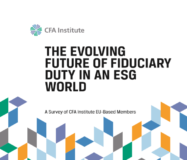The survey gauges the attitude of investment professionals across the EU on what duties such managers should have to integrate Environment, Social and Governance (ESG) factors in their investment decision making process. The survey provides insight into how EU-based investment professionals view such ESG “factoring” generally and whether ESG considerations should be mandated by the regulator.
Svi Rosov, CFA, Director of Capital Markets Policy at CFA Institute and author of the report, commented: “Our survey highlights that a majority of investment professionals across the European Union are already using ESG factors in the investment analysis process, to ensure that all material impacts on the potential investment are considered.”
Among CFA Institute members based in the EU, consideration of ESG factors in investment analysis has been particularly true with regard to the governance aspects of ESG, and now managers are routinely considering the environmental and social risks of a company’s products and behaviours as part of a thorough fundamental analysis.
“These ESG factors are part of the standard mix when analysts are assessing their portfolio investments, yet there is great concern whether the regulator should legally mandate ESG or any other factors considered by the investment profession”, added Rosov.
Key Findings
- Most respondents (85 per cent) believe it appropriate for institutional investors to take ESG factors into account when making investment decisions.
- However, few respondents favoured a regulatory requirement for ESG factoring: respondents in Luxembourg were most opposed to the idea (78 per cent), followed by those in the UK (71 per cent) and Germany (69 per cent). By occupation, research analysts were strongly against (89 per cent).
- And, most respondents (60 per cent) felt that any mandate to consider ESG factors during investment analysis should not translate into forcing the manager or client into an ESG investment policy.
- A sizeable minority (32 per cent) did feel managers should invest in a way that is consistent with the implications of their ESG assessment and findings.
- The survey found little consensus on whether ESG factoring should be formally added to the investment manager’s legal, fiduciary duty: respondents in the Netherlands returned the only majority in favour (57 per cent); respondents in Spain gave the least support (34 per cent).
- A large majority (72 per cent) oppose a legislative mandate that would override what the client wants and instructs the investment manager to consider as relevant investment factors: respondents in Luxembourg felt this most strongly (89 per cent), followed by Spain (78 per cent) and the UK (75 per cent); 17 per cent of all respondents considered it acceptable in the case of ESG factors.
- Finally, respondents are very divided on whether there should be formal taxonomy or rule book on what ESG factors matter in investment analysis. This reflects continuing concern about who creates it and how ESG relevance would be decided. There was relatively little support for an EU-level ESG taxonomy of ESG activities: 35 per cent are in favour of a voluntary taxonomy and 24 per cent would support a mandatory taxonomy.




